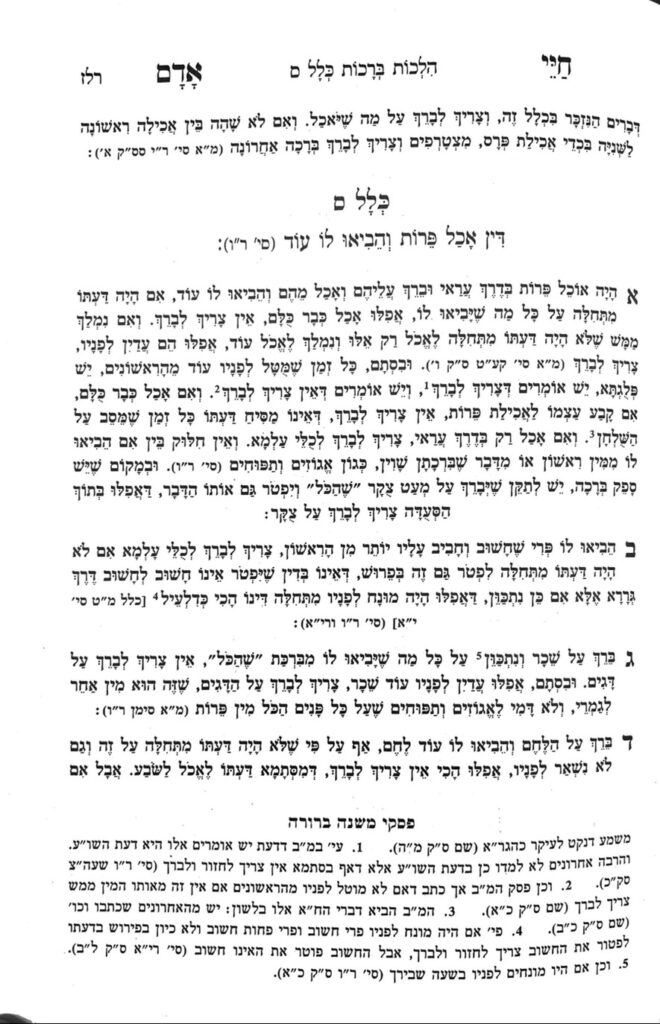We need to correct a mistake. The Chayei Adam has an approach which is not accepted as the halacha, and, because we have been following his text, it has led to a mistake.
The Shulchan Aruch, in 206:5, writes that if one makes a bracha on fruits, and then more fruits are brought to the table, the bracha will cover the new fruits as well, even if they are not the same type of fruit. The Shulchan Aruch does not differentiate between whether there were any of the original fruits remaining on the table or not.
The nosei keilim grapple with whether the Shulchan Aruch is discussing a case where one had explicit daas to include the second fruits, or whether they just had stam daas. The Rema understands that the Shulchan Aruch is discussing a case of stam daas; that is, even though they did not have explicit intent to include the new fruits in their bracha, the bracha extends to them. The Rema explains that the nature of a person is to continue eating from a seuda ketana to a seuda gedolah; that is, to keep eating until satiated, so the bracha made at the beginning extends.
Similarly, we will see in siman 4 that the Chayei Adam says that if one has daas for just a little amount of bread, it extends to new bread brought afterwards, because the nature of bread is to keep eating until one is satiated.
The Rema adds that it is a good idea to have explicit daas, since there are rishonim who disagree with the Shulchan Aruch, but if one did not do so, they certainly would not make a new bracha, because the base halacha is the way he explained it.
The Magen Avraham disagrees, writing that the Shulchan Aruch cannot be discussing a case of stam daas, because stam daas does not extend to new foods brought out after the bracha was made. Rather, the Magen Avraham holds that the Shulchan Aruch is discussing a case of explicit daas. When one does not have explicit daas, but rather stam daas, we differentiate whether there was food remaining on the table.
The Chayei Adam follows the Magen Avraham, as we saw in siman 1. However, the Mishnah Berurah, in Shaar Hatziyun (sk 20), points out that many achronim disagree with the Magen Avraham, including the Shach, Taz, Gra, Drisha, Elyah Rabba, and Maamar Mordechai. They understand the Shulchan Aruch in accordance with the Rema, that a bracha one makes at the beginning of a meal covers all foods of the same bracha brought later, regardless of whether any of the original fruit remained, and regardless of whether the new fruit was of the same type as the original fruit.
However, the Mishnah Berurah writes that, although the Rema’s understanding is the accepted understanding of the Shulchan Aruch, it does not mean we pasken in accordance with the Shulchan Aruch. Rather, the psak of the Shulchan Aruch that the original bracha extends to a new food which is of a different type than the original food is up for debate, and we pasken that it will only work for the same type of food if the original foods were totally consumed. If some of the original food is still on the table, then we will apply the Shulchan Aruch’s psak that the bracha extends even to a different type of food.
Now, we can learn the Chayei Adam. The Chayei Adam points out that in a case where one can apply the Shulchan Aruch (i.e., when there is leftover of the original food on the table, or when the new food is of the same type as the food upon which the bracha was made), it only applies between one food to another, or one drink to another. It does not work between a food and a drink or vice versa.
If both the food and drink were on the table at the time of the bracha, then the bracha on food will work for drink or vice versa. And if one had explicit daas, then the bracha for one will work for the other as well.
When one is talui b’daas acheirim (dependent on someone else, such as whatever their wife or host brings to the table), it is as though they have explicit daas to follow the other person’s daas.
Summary
- The Mishnah Berurah paskens that one’s bracha will only extend:
- If there is no more of the original food on the table–to the same type of food
- If there is more of the original food on the table–to any food
- The Chayei Adam adds that even if there is more of the original item on the table, a food will not cover a drink, and vice versa.
- When one is talui b’daas acheirim it is as though they have explicit daas to follow the other person’s daas.



